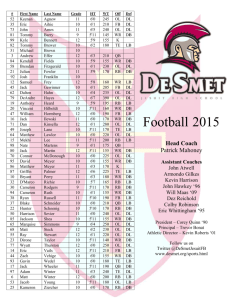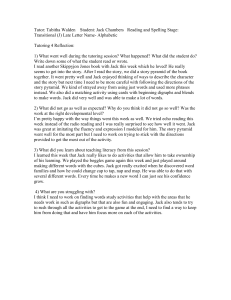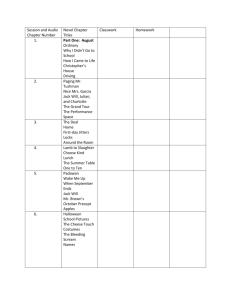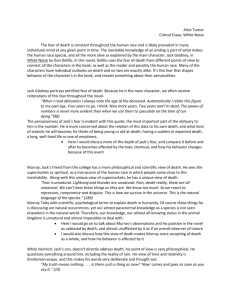Source: pp.10-11. "Faggot!" reverberates down the corridor. Homosexual labels are common terms...
advertisement
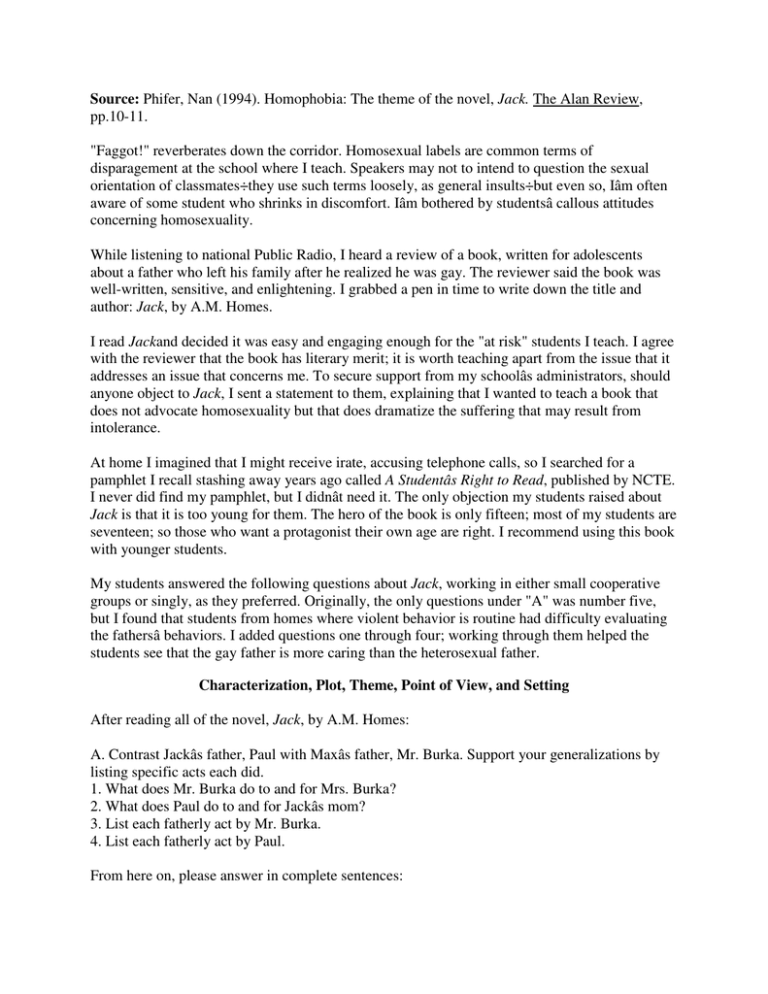
Source: Phifer, Nan (1994). Homophobia: The theme of the novel, Jack. The Alan Review, pp.10-11. "Faggot!" reverberates down the corridor. Homosexual labels are common terms of disparagement at the school where I teach. Speakers may not to intend to question the sexual orientation of classmates÷they use such terms loosely, as general insults÷but even so, Iâm often aware of some student who shrinks in discomfort. Iâm bothered by studentsâ callous attitudes concerning homosexuality. While listening to national Public Radio, I heard a review of a book, written for adolescents about a father who left his family after he realized he was gay. The reviewer said the book was well-written, sensitive, and enlightening. I grabbed a pen in time to write down the title and author: Jack, by A.M. Homes. I read Jackand decided it was easy and engaging enough for the "at risk" students I teach. I agree with the reviewer that the book has literary merit; it is worth teaching apart from the issue that it addresses an issue that concerns me. To secure support from my schoolâs administrators, should anyone object to Jack, I sent a statement to them, explaining that I wanted to teach a book that does not advocate homosexuality but that does dramatize the suffering that may result from intolerance. At home I imagined that I might receive irate, accusing telephone calls, so I searched for a pamphlet I recall stashing away years ago called A Studentâs Right to Read, published by NCTE. I never did find my pamphlet, but I didnât need it. The only objection my students raised about Jack is that it is too young for them. The hero of the book is only fifteen; most of my students are seventeen; so those who want a protagonist their own age are right. I recommend using this book with younger students. My students answered the following questions about Jack, working in either small cooperative groups or singly, as they preferred. Originally, the only questions under "A" was number five, but I found that students from homes where violent behavior is routine had difficulty evaluating the fathersâ behaviors. I added questions one through four; working through them helped the students see that the gay father is more caring than the heterosexual father. Characterization, Plot, Theme, Point of View, and Setting After reading all of the novel, Jack, by A.M. Homes: A. Contrast Jackâs father, Paul with Maxâs father, Mr. Burka. Support your generalizations by listing specific acts each did. 1. What does Mr. Burka do to and for Mrs. Burka? 2. What does Paul do to and for Jackâs mom? 3. List each fatherly act by Mr. Burka. 4. List each fatherly act by Paul. From here on, please answer in complete sentences: 5. Compare Paul and Mr. Burka as people and as fathers. Which is better? Why? This answer, written by a two-student team, was typical: "Paul is a better person and has much more to contribute to society than Mr. Burka. Paul is compassionate, affectionate, open and honest when dealing with his feelings. Mr. Burka treats his family as if they were all in the military. He also suppresses his feelings until they explode with physical violence. Paul is continually spending quality time with Jack. Mr. Burka spends quantity time, but not quality time with his sons." B. What is the main idea, the theme, expressed in this book? In other words, what is the authorâs message? This question was the one I most wanted insightful answers to, and I was pleased. For example: "I think the intention of this book was to help people understand the differences in others. I was left with a better idea of what homosexuality is and that people donât necessarily choose to be gay. Also, that if people are gay, they shouldnât try to cover it up. A personâs sexual preference doesnât change who they really are." Another group wrote: Donât judge a book by its cover, but by whatâs on the inside. The theme is that people who are not norm to society are often better people than the norm of our society. The idea is not to judge people by what they are, but by the actions in which they chose to deal with other people." C. Jack is written in first person. The author used the pronoun "I" rather than the pronoun "he," and the story is told from the point of view of the main character. What are some advantages in writing this novel in first person? D. The author set her novel in contemporary, middle-class suburban America. Speculate about why she chose this setting instead of some other. Jack succeeds in causing students to look at their own assumptions and attitudes. In this way, and in its use of the vernacular, it possesses some of the strengths of Huckleberry Finn. I would like to teach Jack along with To Kill a Mockingbird by Harper Lee and Catcher in the Rye by J.D. Salinger and ask my students to compare these books. A colleague suggested that I include Coming of Age in Mississippi by Anne Moody. Complementary writing assignments could be about people the students have known who were "picked on" at school or elsewhere. My writing students have always have a repertoire of experiences on this topic. I was relieved and surprised that only one student expressed offense from Jack; he confided his feelings to me after class, saying, "It sucks." A few others said it was a good book; but, as I mentioned earlier, a few thought it should be read by younger students. At termâs end I was delighted when, to the course evaluation question "of the areas covered in this course, which aspects will be of greatest use to you?" An anonymous student wrote, "the novel Jack because it showed me another point of view toward gay people than just calling them fags."


